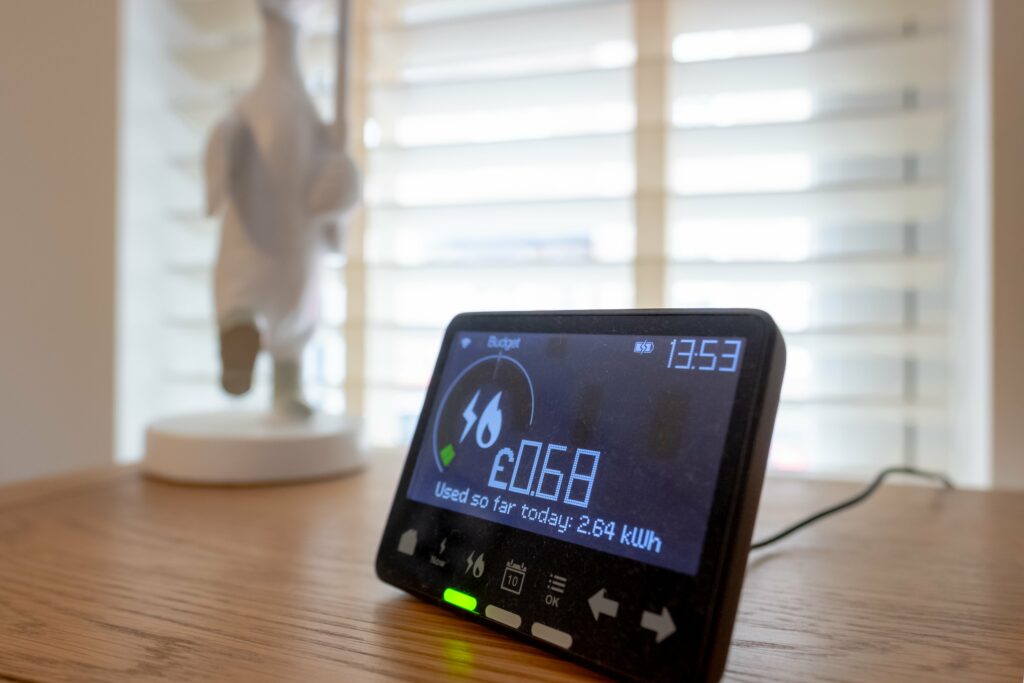Traditional analogue utility meters are slowly being replaced by a more sophisticated and accurate device called a Smart Meter.
It has been estimated that over 23 million homes in the UK have adopted smart meters, marking a pivotal shift in how we monitor and control our energy usage. But what exactly are smart meters, how do you get one and what are their benefits? In this article we find out:

What is a Smart Meter?
A smart meter is a digital device that accurately records your energy consumption (gas and electricity) in real-time. Allowing you to see at any given time, just how much energy is being used in your home and how much that is going to cost when your bill lands.
Unlike traditional meters, it communicates this information directly to your energy supplier, eliminating the need for manual meter readings and providing you with real-time usage information. As a result, it offers improved accuracy, transparency and control over your energy usage.
Benefits of Smart Meters
- Real-Time Information & Accuracy: Smart meters provide accurate, real-time information about your energy consumption and how much it is costing you. This means no more estimated bills – you only pay for what you use.
- Better Energy Management: By providing real-time data on energy consumption, smart meters empower homeowners to make more informed decisions about their energy usage, helping to reduce consumption and lower energy bills.
- Environmental Impact: By promoting efficient energy use, smart meters play a crucial role in reducing carbon emissions and mitigating the effects of climate change.
- Time-of-use Tariffs: Smart meters support time-of-use tariffs, allowing you to take advantage of off-peak energy rates if they are available to you.
Identifying if You Have a Smart Meter
Are you unsure if you have a smart meter installed in your home? To determine this, you can look at your energy meter. If your meter has a digital display that shows your energy consumption in real-time, and you no longer need to submit meter readings, it is likely that you have a smart meter.
Switching to a Smart Meter
The process of getting a smart meter is relatively straightforward. As part of a nationwide rollout, energy suppliers are obliged to offer smart meters to all their customers. Contact your energy supplier to arrange an installation appointment. There is usually no additional cost to you the consumer for either the smart meter or the installation.
Can Smart Meters Save You Money?
A smart meter in itself doesn’t directly save money, but it offers invaluable insights that can contribute to reduced bills. The in-home display unit provides real-time energy consumption data throughout the day, week, month, or year. This can highlight opportunities to improve your energy efficiency, leading to potential savings.
Monitoring everyday tasks like making a cup of tea or using a tumble dryer allows you to gauge their impact on your energy consumption and ultimately, your bills. As such, smart meters reduce the chance of unexpected expenses and aid in managing your household budget effectively. Some energy suppliers are incentivising smart meter adoption by offering discounted tariffs, which can lead to further savings.
Switching Energy Suppliers with a Smart Meter
The ability to switch energy suppliers while having a smart meter installed is a valid concern for many. The task of upgrading the UK’s gas and electricity system is indeed challenging and has led to some complexities concerning smart meters and switching.
First Generation (SMETS1) Smart Meters
The first wave of smart meters, known as SMETS1, installed during the initial rollout, may temporarily lose their smart functionality when switching suppliers. In such cases, you may need to revert to manual meter readings. However, upgrades are planned for SMETS1 meters to enhance their compatibility with multiple suppliers, all done remotely without requiring an installer visit. Importantly, even if a smart meter enters ‘dumb mode’ due to a supplier switch, it continues to provide real-time usage data via the in-home display.
Second Generation (SMETS2) Smart Meters
The newer SMETS2 meters maintain full compatibility with the DCC (Data Communications Company), the secure national network facilitating communication between meters and suppliers. Therefore, switching suppliers with a SMETS2 meter should pose no issue.
Identifying Your Smart Meter Type
Smart meters installed before 2018 are likely SMETS1 models. However, as some suppliers were using their stock of SMETS1 meters even after 2018, a meter installed later might still be of the first generation. To definitively identify your smart meter type, it’s best to contact the supplier who performed the installation.
Smart meters are more than just a modern upgrade for traditional meters. They are an essential tool for energy management, cost savings, and environmental sustainability. By providing real-time, accurate information about your home energy consumption, they put control back in your hands. If you haven’t already, consider making the switch to a smart meter and join the millions of UK households enjoying the benefits of this smart technology.








